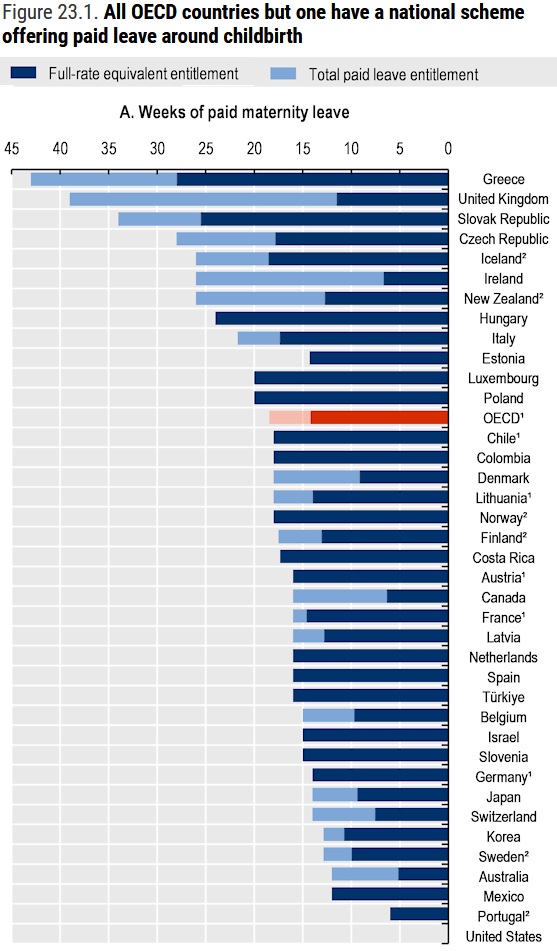Usually with regard to government-run health care, folks on the left commonly criticize the United States for being the “only country” that does not provide this or that handout from the government.
That should not be a persuasive argument without first looking at whether the United States is doing better or worse than other nations.
And based on comparative living standards, the United States is far ahead.
So why copy the policies of countries where people are way behind?
But that doesn’t seem to matter to proponents of bigger government such as the bureaucrats at the Paris-based Organization for Economic Cooperation and Development.
Here are some excerpts from an OECD publication about paid parental leave, authored by Jason Fluchtmann.
Except for the United States, all OECD countries have national statutory rights that entitle mothers to (de facto) paid maternity leave around childbirth. …these entitlements are designed to protect infants and mothers around childbirth, to give both parents the necessary time to provide childcare during the early stages of life of a new-born, and ensure that fathers and mothers are financially supported during their time on leave… Across the OECD, statutory rights to paid maternity leave are provided with an average length of 18.5 weeks as of April 2022…, ranging from 43 weeks in Greece (the longest entitlement) to none in the United States – the only OECD member with no national provision of paid maternity leave.
Here is an accompanying chart showing the United States compared to other OECD nations (needless to say, the article never addresses the issue of whether Greece should be a role model).

To hammer home the point, the OECD article concludes with advice for governments.

One thing you may notice is that the OECD report, for all intents and purposes, only looks at supposed benefits and ignores very real costs.
That’s incredibly sloppy. Such policies have very substantial costs.
Here’s some of what Veronique de Rugy wrote a few years ago for Reason.
…calls are intensifying for the federal government to implement paid leave, which may unwittingly hurt those whom the program claims to help. …women would like to get paid to stay home after the birth of their children, yet that’s no more evidence of a market failure than is my not driving a Tesla, even though I’d like to drive one if it were free. This isn’t a reason for government to mandate paid leave (or Teslas) for all workers. …Because paid leave is costly, when firms provide this benefit, they change the composition of their employees’ total compensation by reducing the value of workers’ take-home pay to offset the cost of providing paid leave. While some workers prefer this mix in their pay packages, others don’t. In particular, mandated leave would be a hard trade-off for many lower-paid women who would prefer as much of their income as possible in the form of take-home pay. In fact, polls show that when women learn of the trade-offs inherent in any government-mandated paid-leave policy, their support for such a policy collapses.
As is always the case, Veronique is right. Paid parental leave is not a freebie. If politicians force employers to incur certain costs, workers will bear the burden.
P.S. Parental leave was one of many issues where Trump was in favor of big government rather than economic liberty.
P.P.S. I’m not surprised that OECD bureaucrats push statist policies. They get tax-free salaries (subsidized by American taxpayers!) and thus are insulated from the real-world impact of their dirigiste agenda.
———
Image credit: OECD Organisation for Economic Co-operation and Development | CC BY-NC-ND 2.0.




